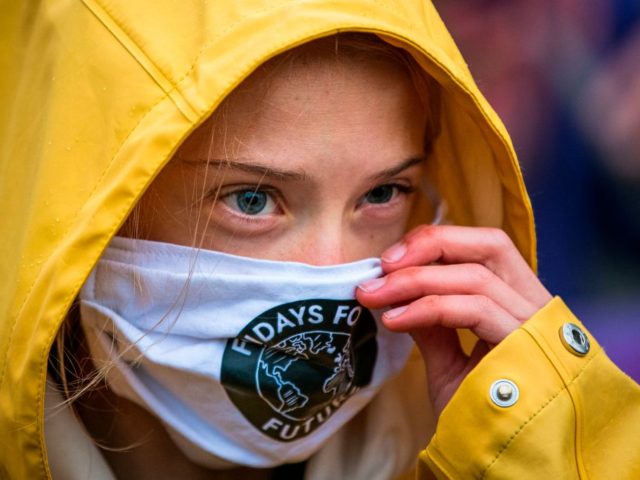Doom Goblin Greta Thunberg’s first big TV show has proved to be a massive turn off for viewers.
The BBC was so confident of the Doom Goblin’s pulling power that it commissioned three one-hour-long episodes of its documentary series Greta Thunberg: A Year to Change The World.
The series follows the pigtailed climate puppet from her native Sweden to the US, Chile, Spain, the UK and Switzerland as she spends a year bunking off school while ‘exploring the science of global warming and challenging world leaders on the growing crisis.’
But even though the BBC gave it its best shot — the primetime 9pm slot, a guest appearance from Sir David Attenborough, villainous cameos by former President Donald Trump and Russian President Vladimir Putin, dramatic footage of calving glaciers and allegedly endangered coral reefs, plus endless shots of Thunberg looking anguished and impassioned — the show has tanked.
According to the ratings figures from Overnights.TV the show on the BBC’s flagship channel BBC1 lost 55 percent of its audience from the previous slot. It averaged 1.08 m viewers with a 6.30 percent share of the total audience. This compares most unfavourably with the show in the same slot the week before, Masterchef, which averaged 3.56 million viewers with an 18.9 percent audience share.
One possibility for its failure is that audiences are suffering from a severe case of Greta fatigue. Another is that viewers aren’t nearly as interested in climate doom as politicians, green activists or the BBC think they ought to be.
At the beginning, in one of several awkward, stilted pieces to camera, Thunberg says:
I don’t want you to listen to me. I want you to listen to the science.
But the science, as Thunberg presents it, is very one-sided. When Thunberg brandishes ‘the science’ as some kind of immutable truth which we should revere like Biblical scripture, she is falling into exactly the same trap as pop-science showman Neil DeGrasse Tyson .
DeGrasse Tyson tweeted out self-importantly that ‘The good thing about Science is that it’s true, whether or not you believe in it.’
Tyson was promptly schooled by the Steak-Umm Twitter account.
Steak-umm is right and Thunberg and deGrasse Tyson are wrong: science is indeed an ‘ever refining process to find truth’ — a method of discovery, not a fixed dogma.
Obviously, Greta Thunberg wouldn’t know this having spent so much time out of school. Which makes it all the more irresponsible of the BBC to have given this semi-educated pig-tailed propagandist so much airtime.
In the second episode she travels to Davos, Switzerland to speak at the World Economic Forum’s annual summit. When it was filmed in early 2020 this may have seemed innocuous enough. But in light of what we have learned since about the globalist ambitions of the WEF and its plans for a ‘Great Reset’ in which we’ll no longer own property but, apparently, be happy, it looks a lot more sinister.
When at the beginning of the first episode Vladimir Putin is shown criticising Thunberg, the documentary makers are presumably hoping to enlist sympathy for the Doom Goblin.
But on this occasion, Putin happens to be absolutely spot on. He says:
No one has explained to Greta that the world is complex and diverse.
No indeed — which may be another reason why audiences find this documentary such a turn-off. Nobody likes being banged over the head for an hour with sledgehammer green movement talking points. They’d prefer a bit of nuance and humour — neither of which, unfortunately, are part of the Greta the Doom Goblin’s skill set.

COMMENTS
Please let us know if you're having issues with commenting.